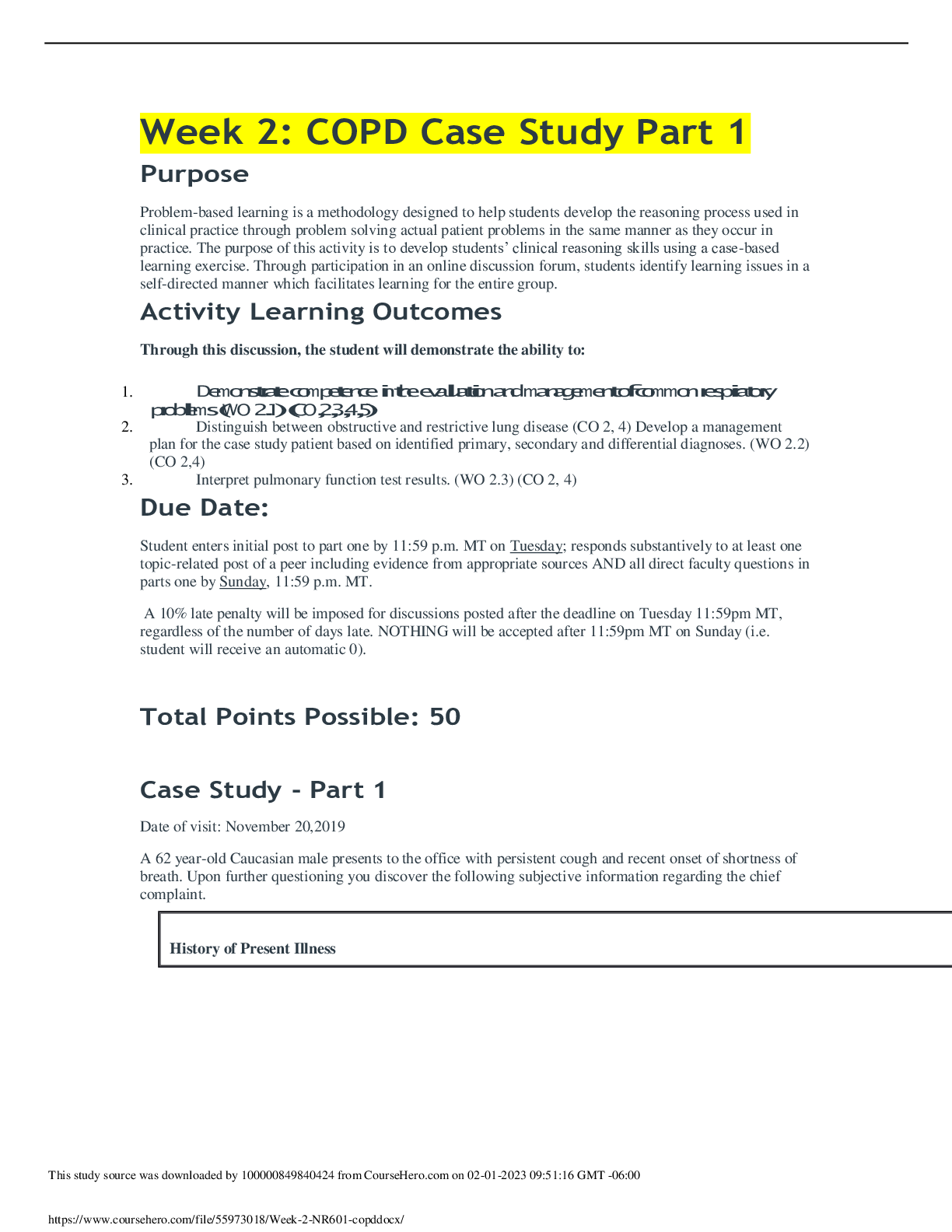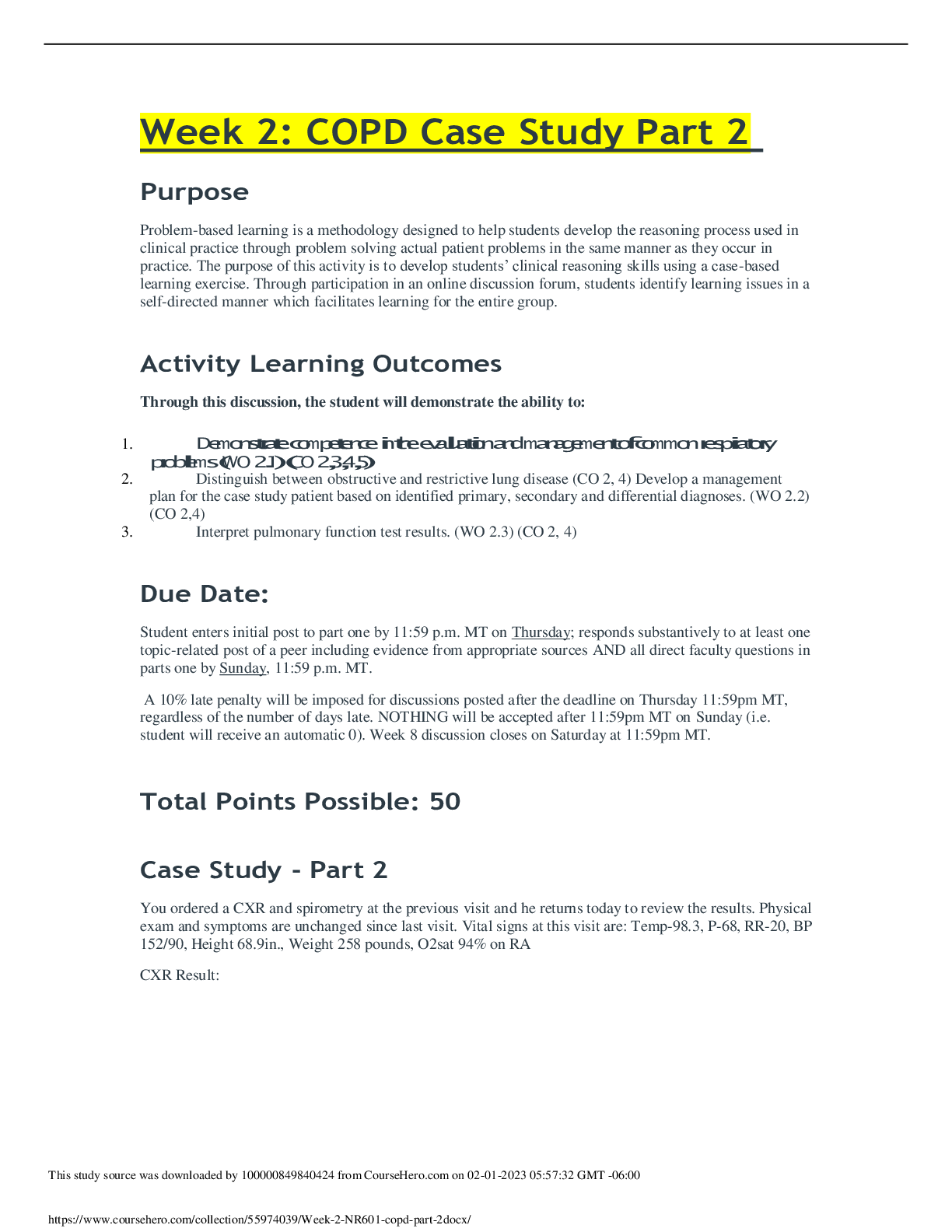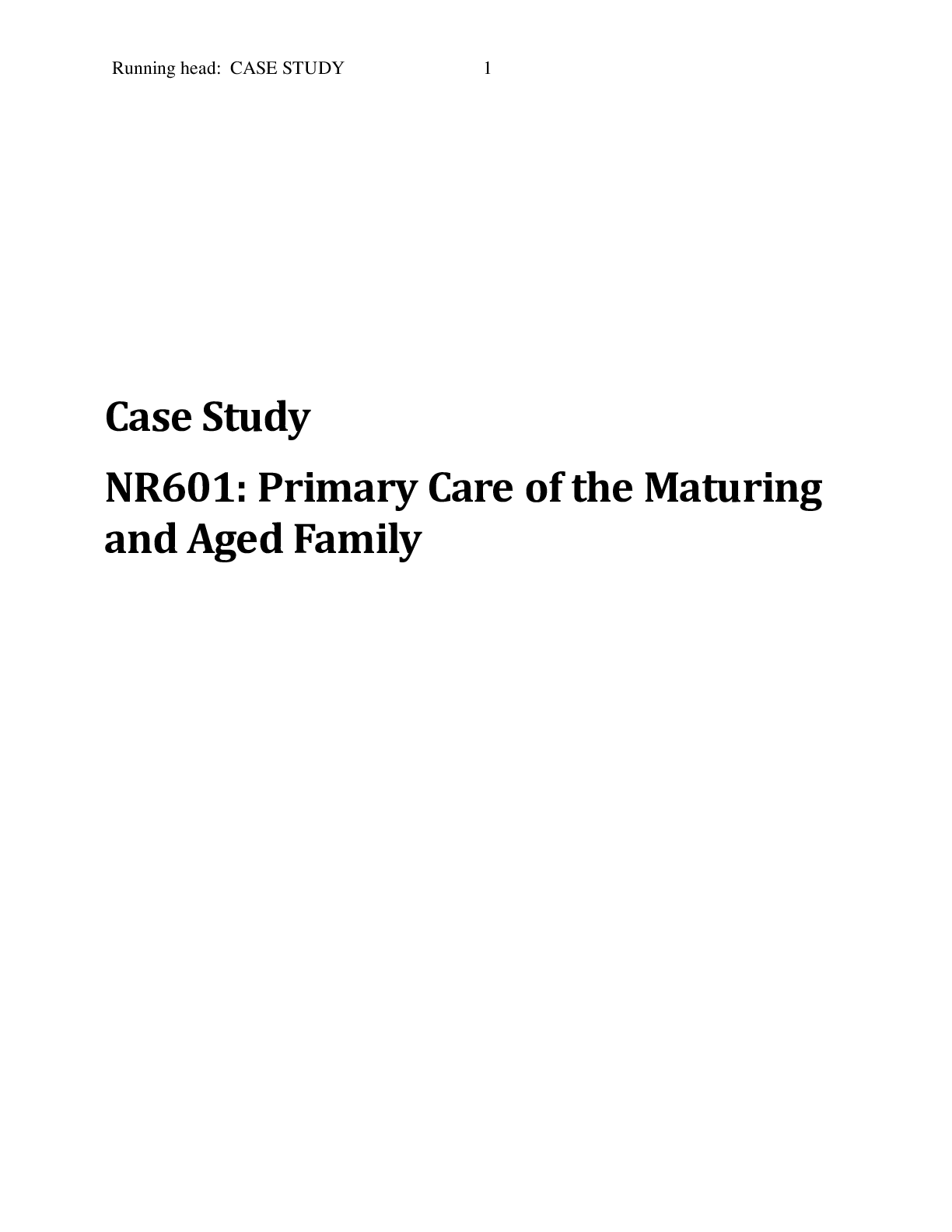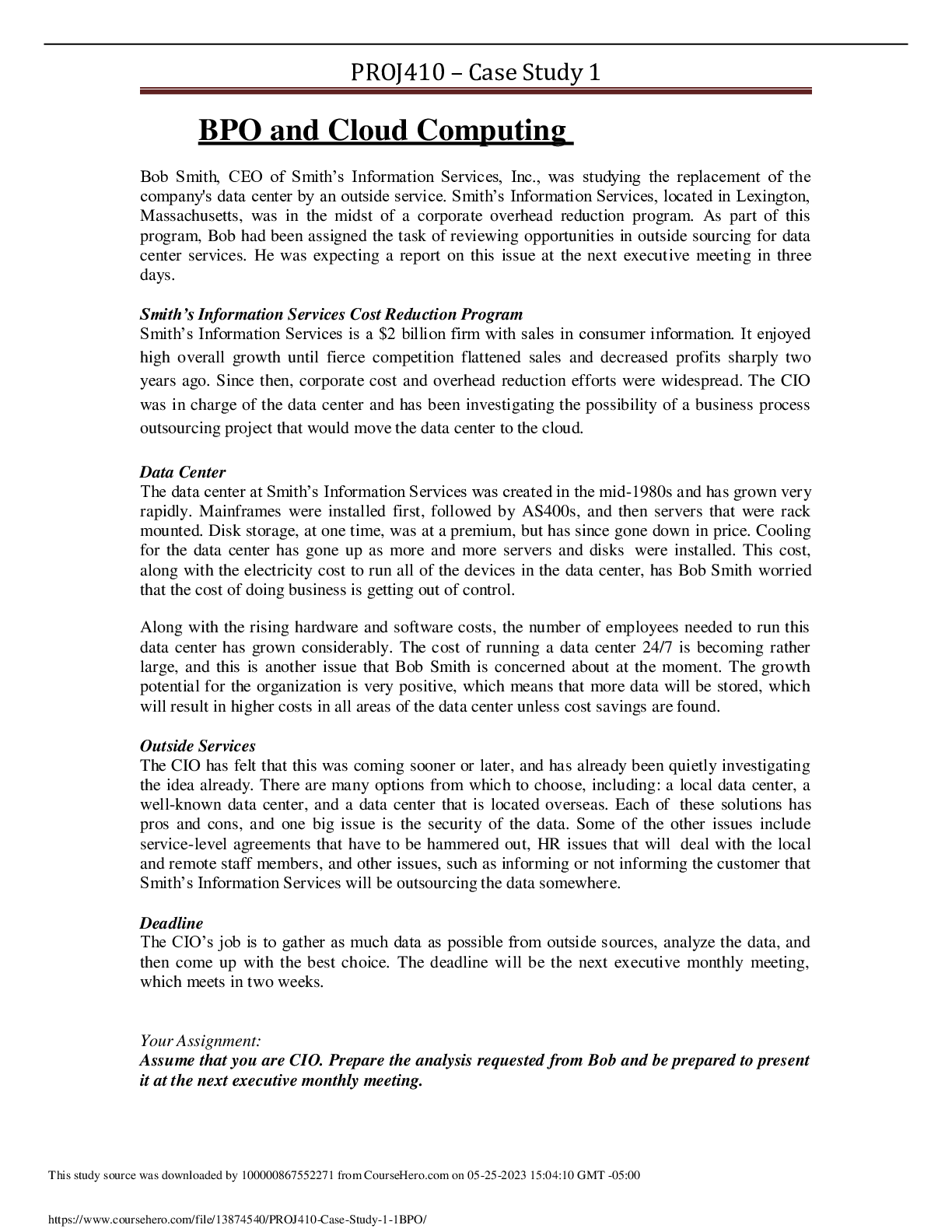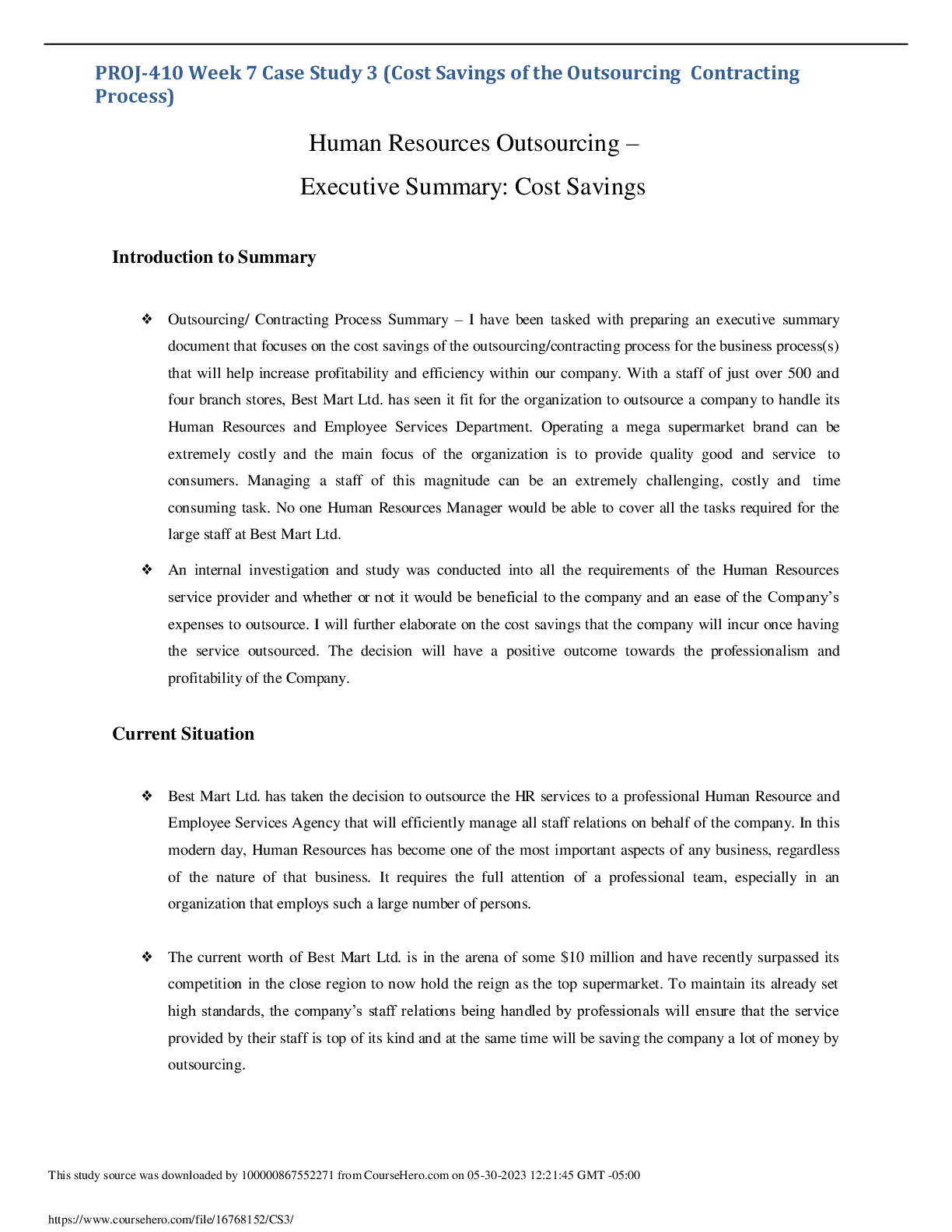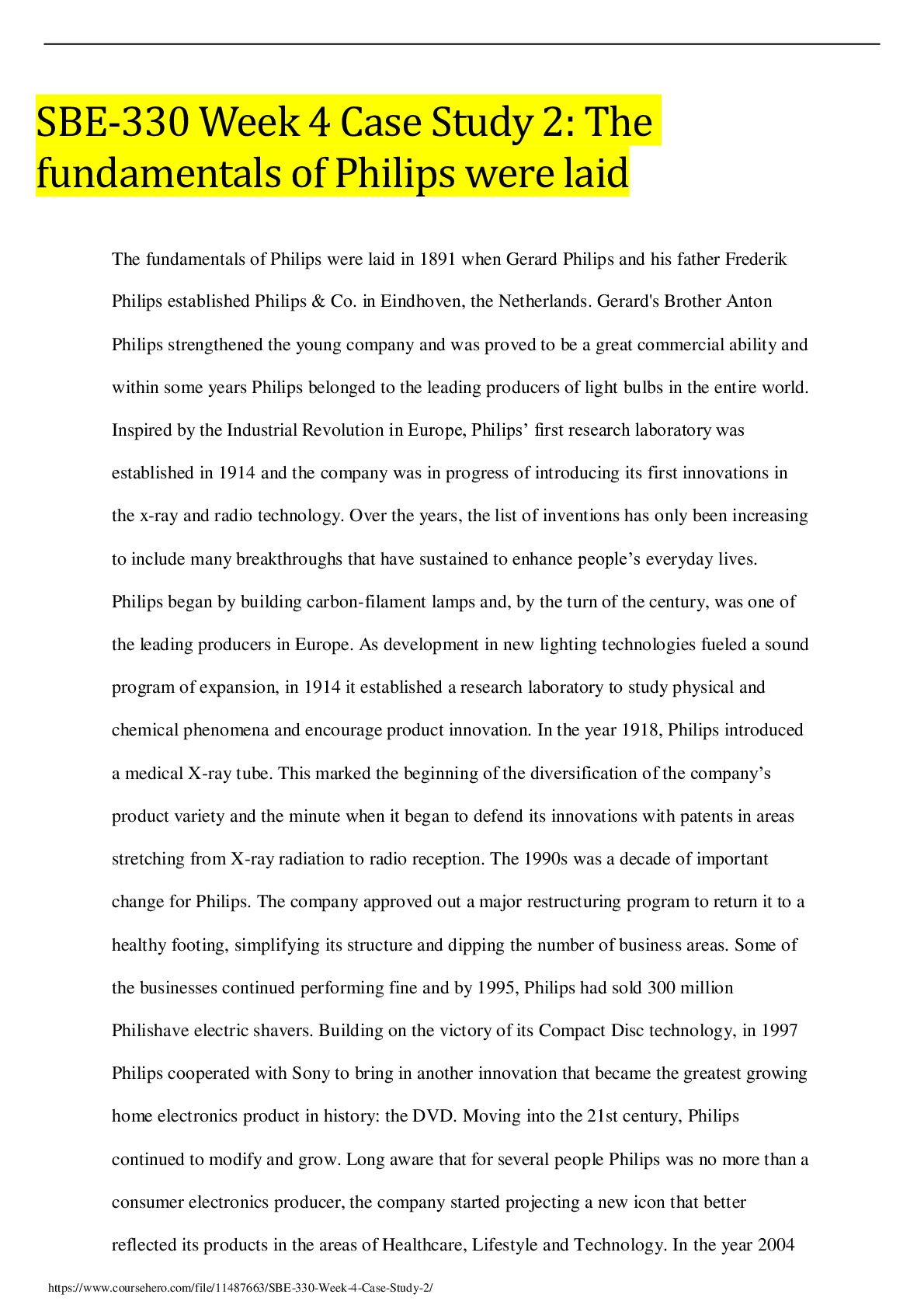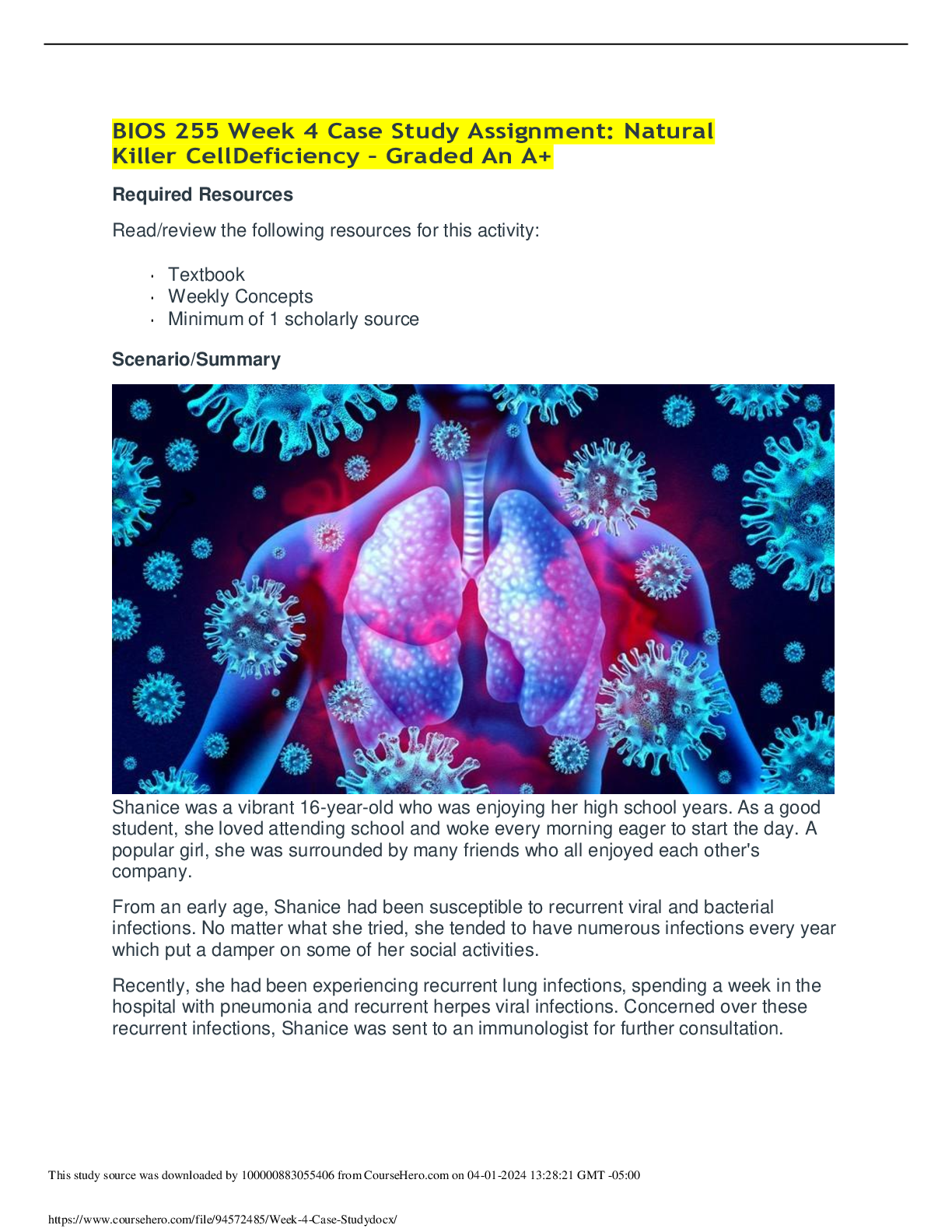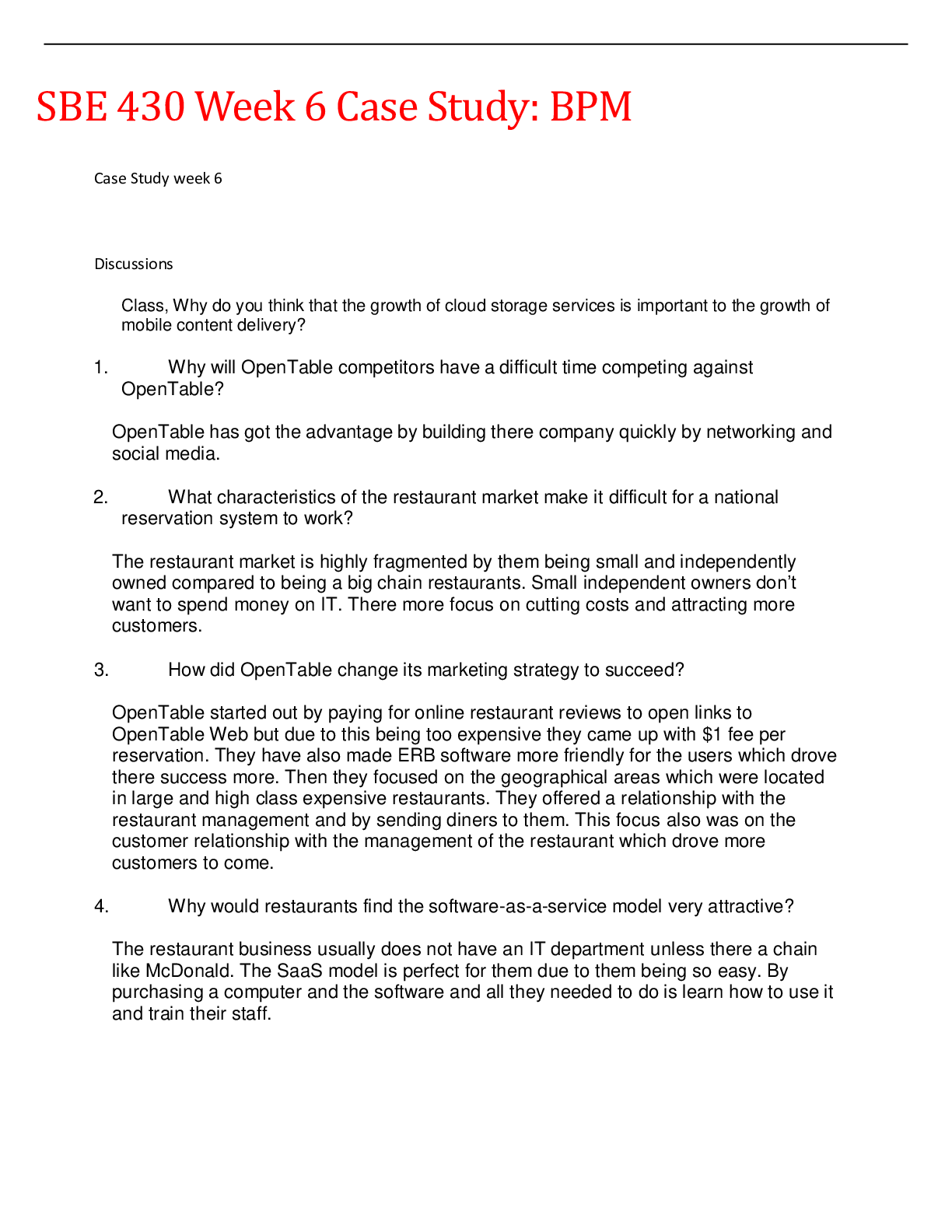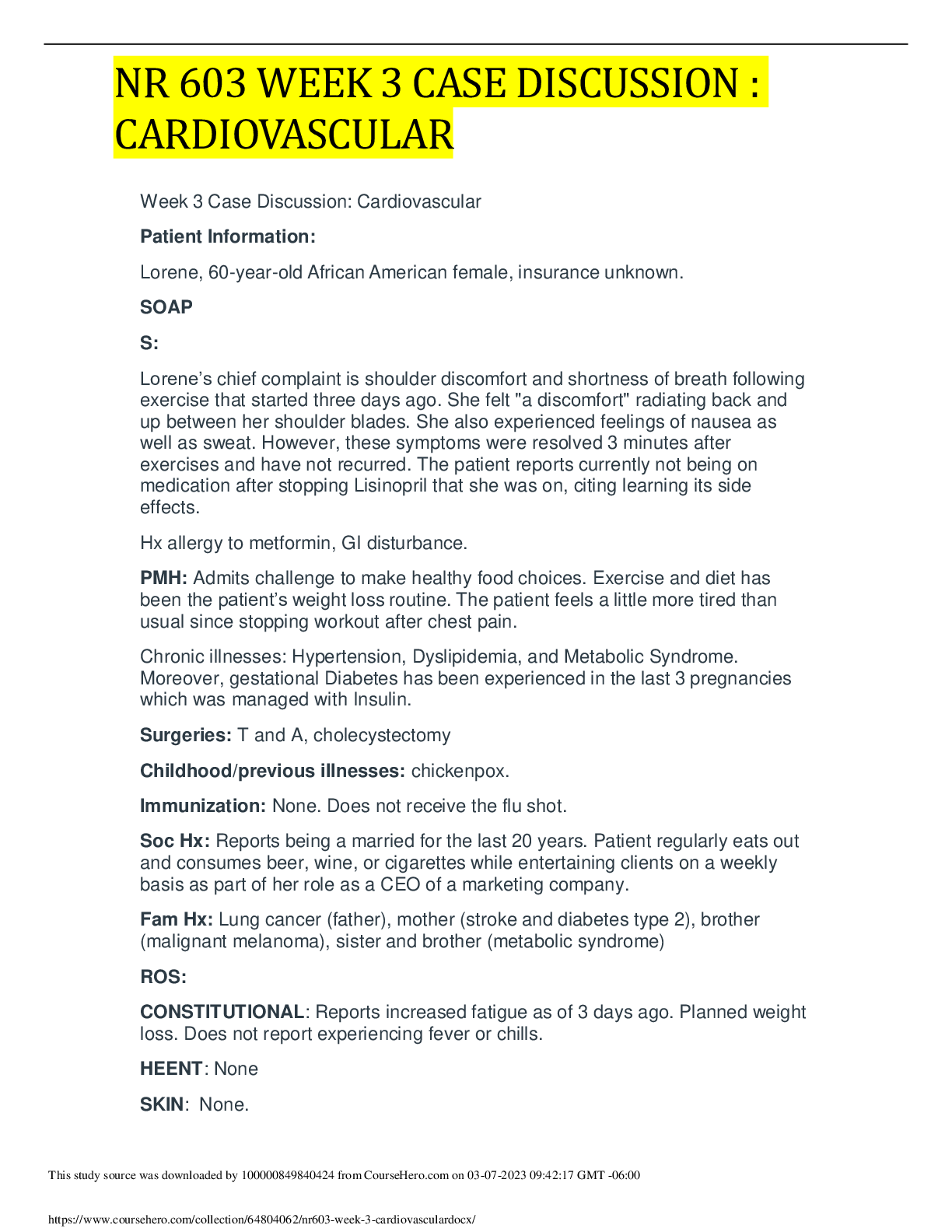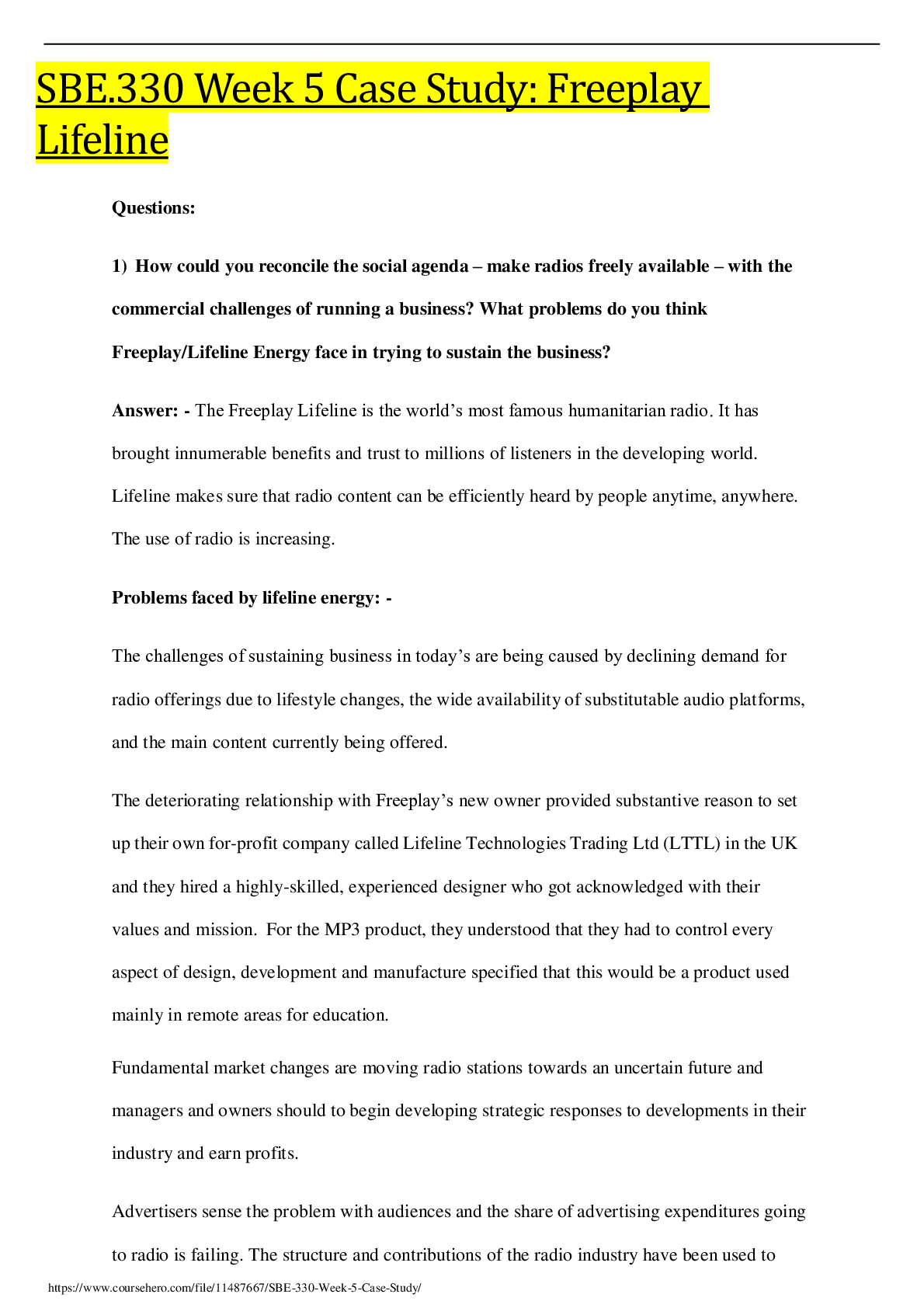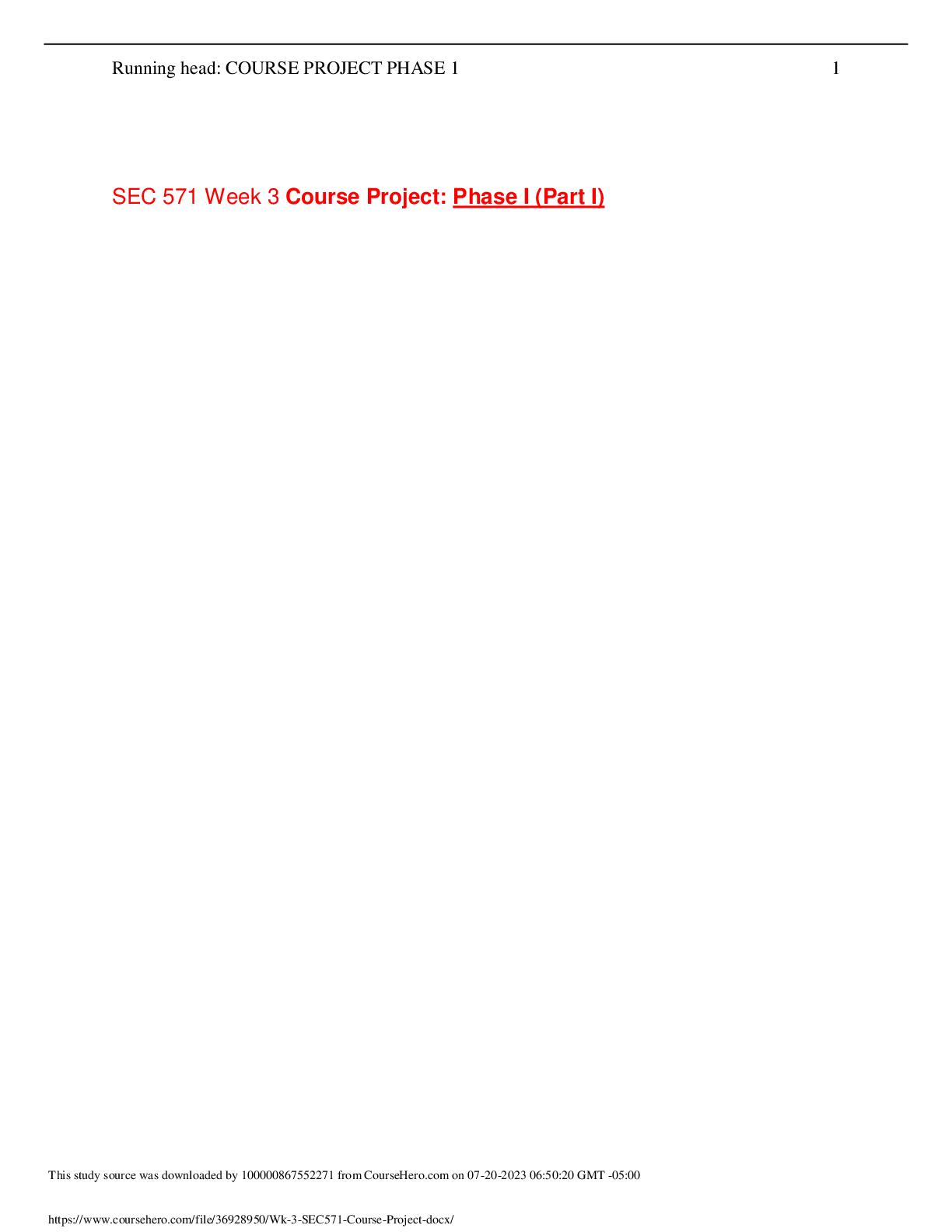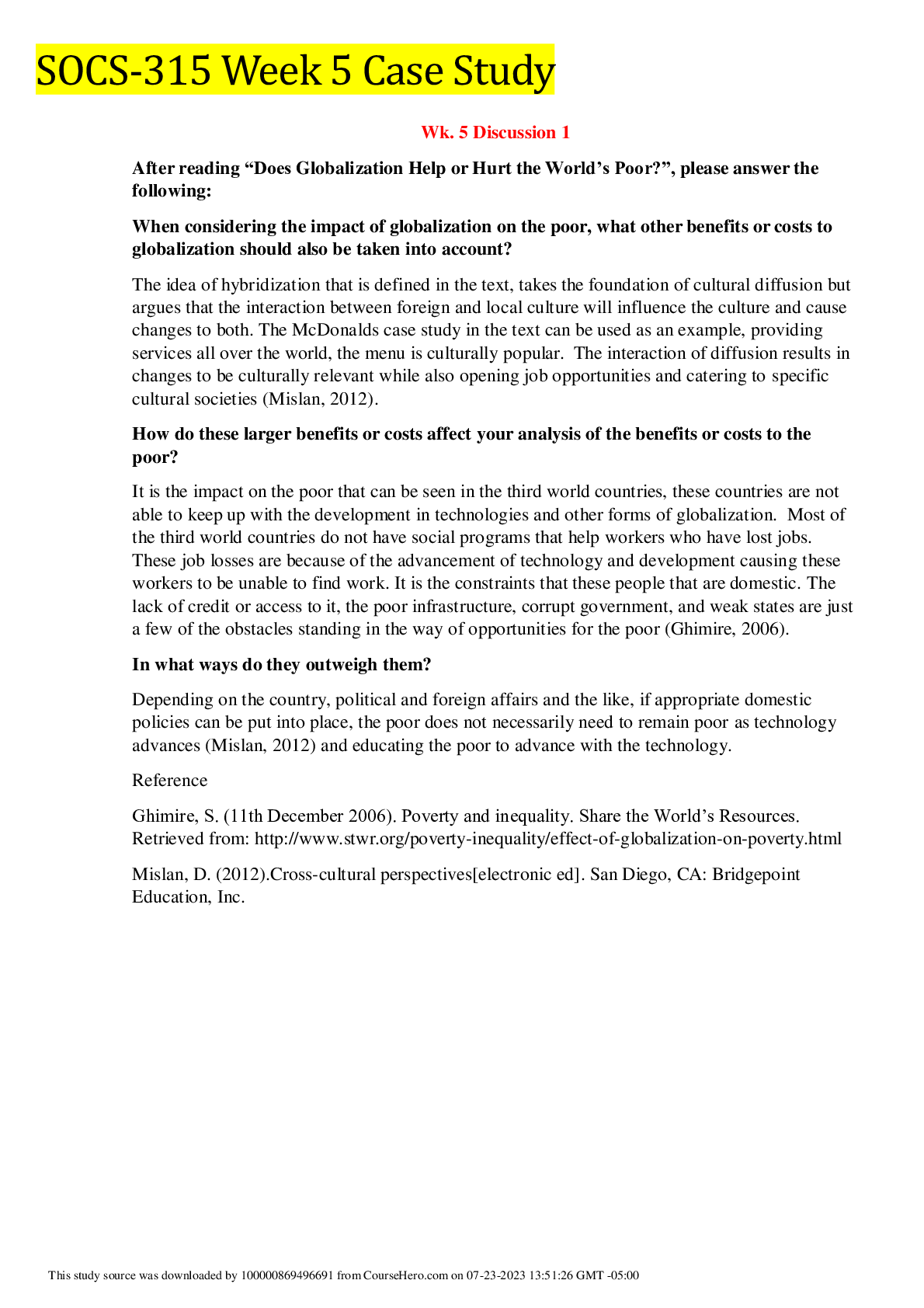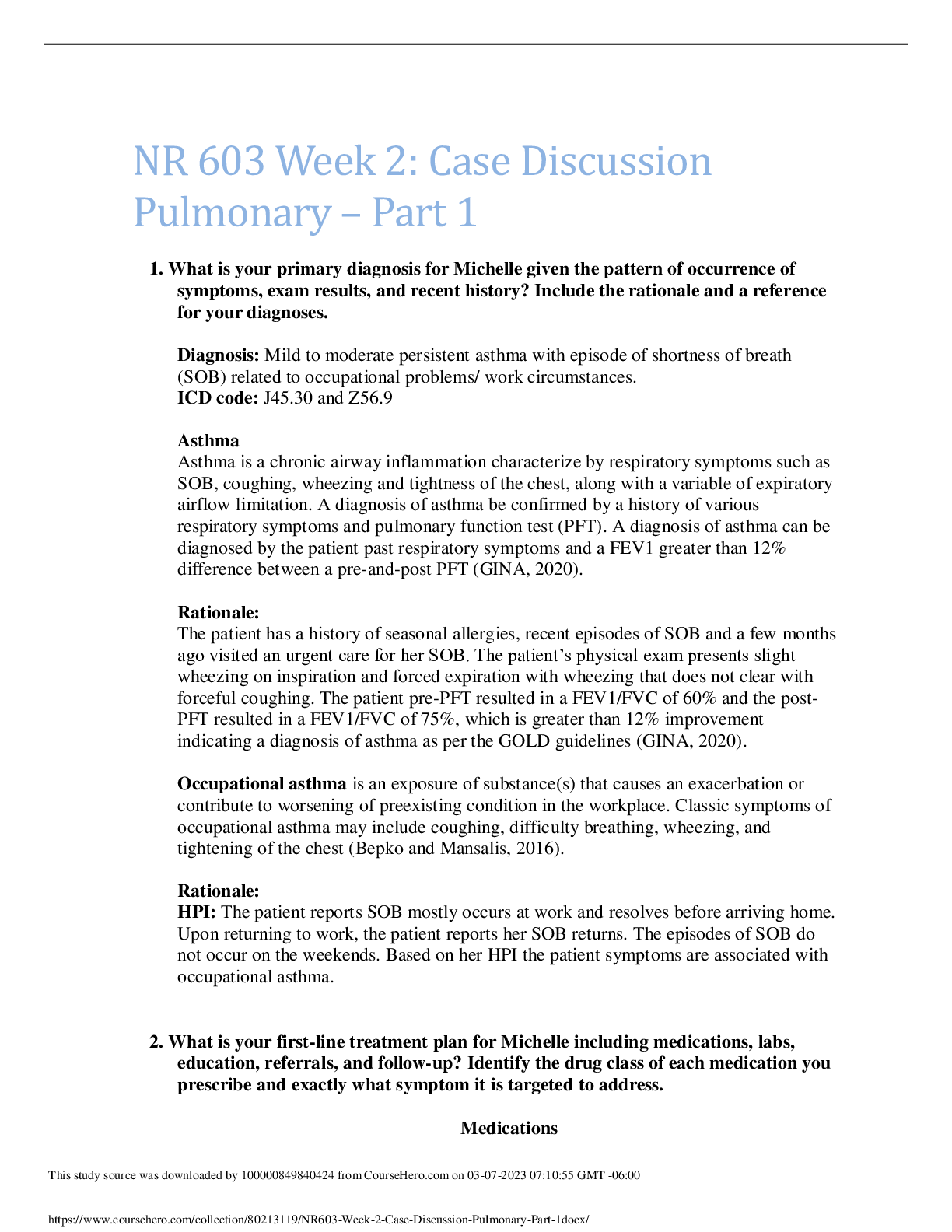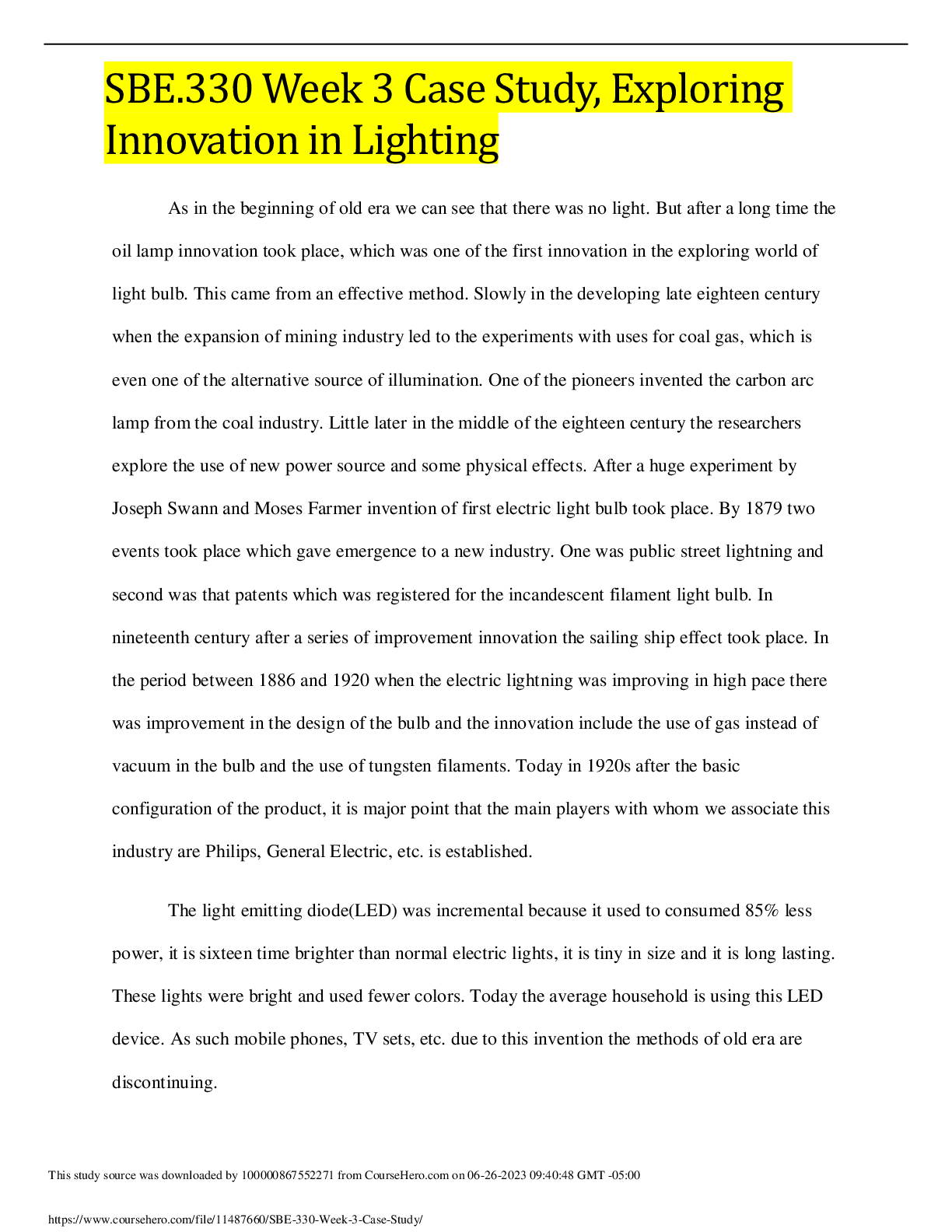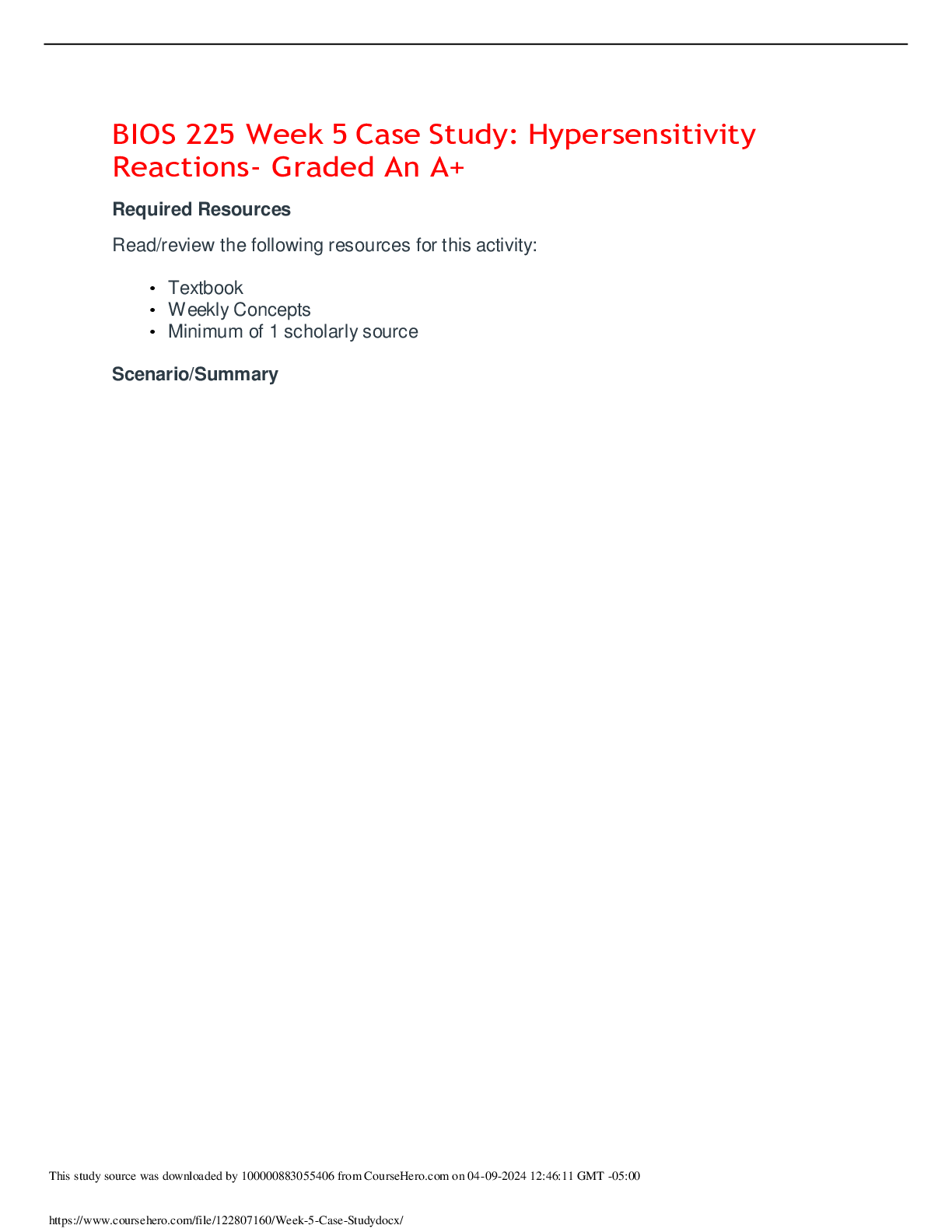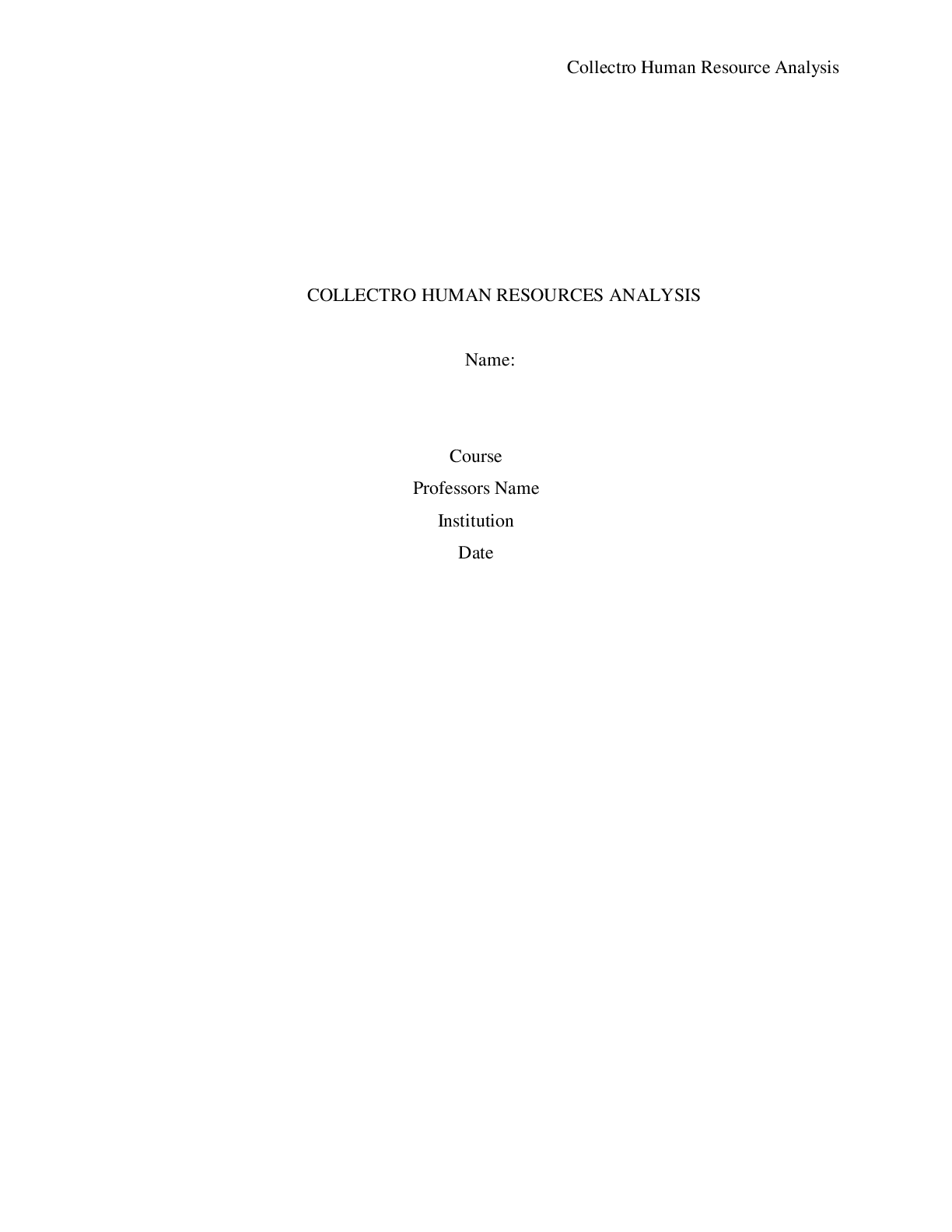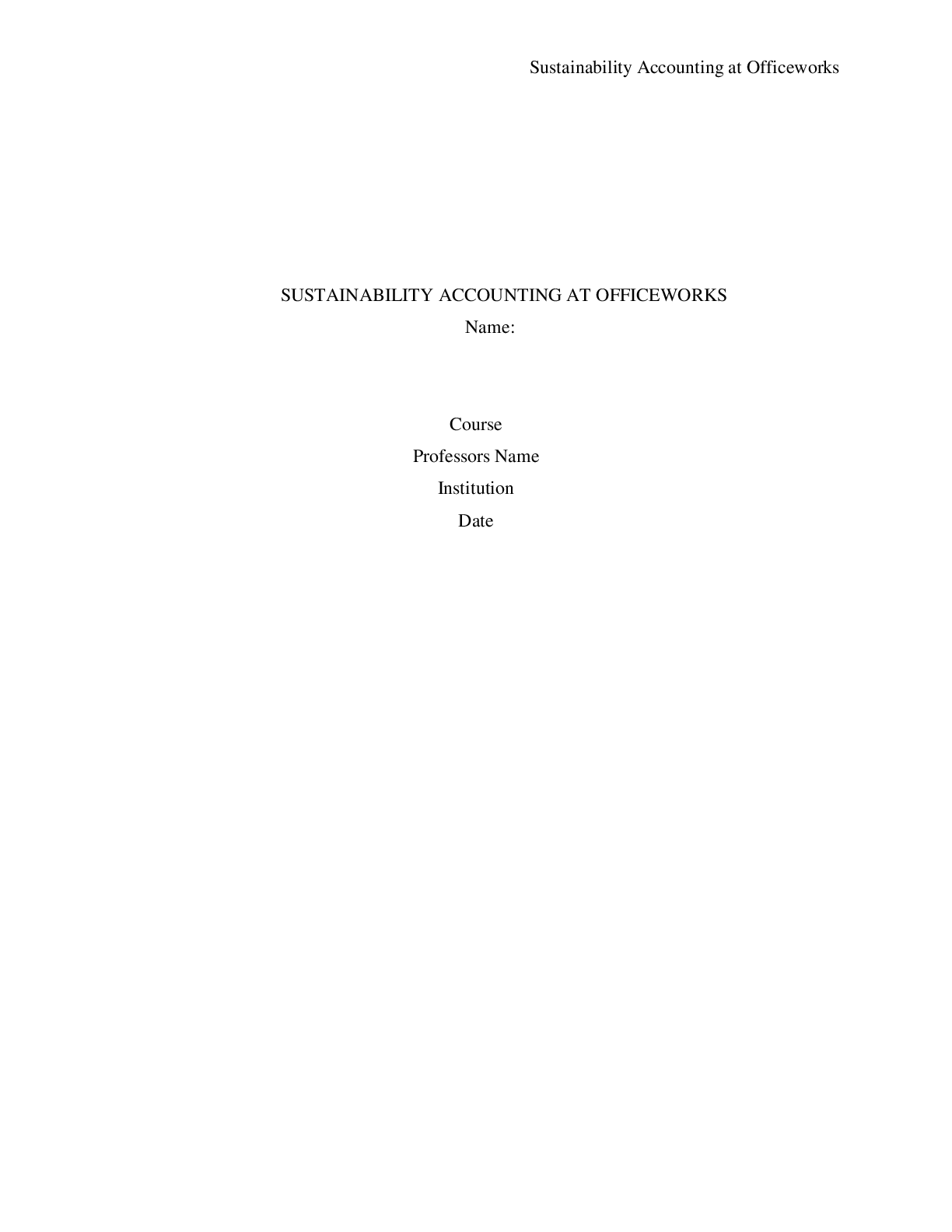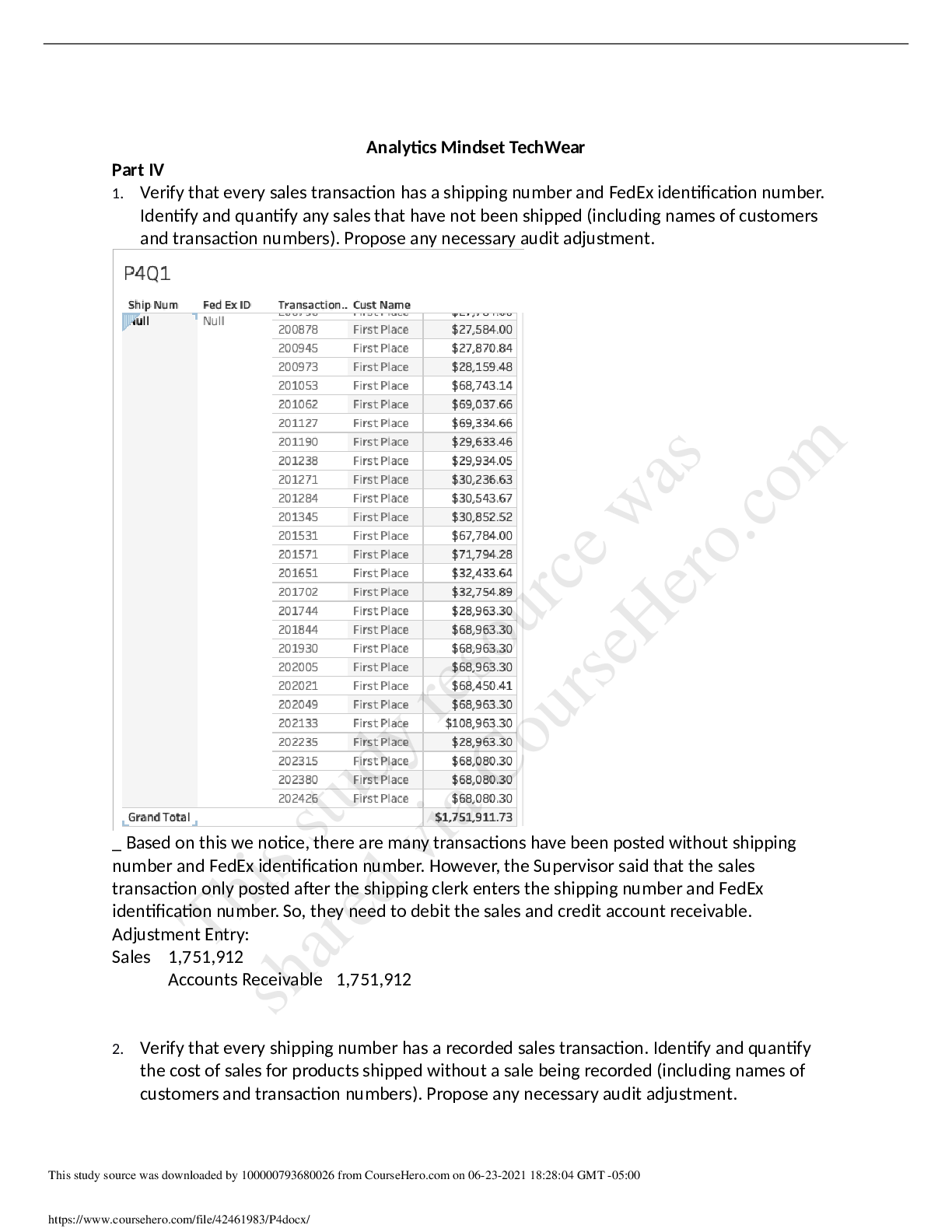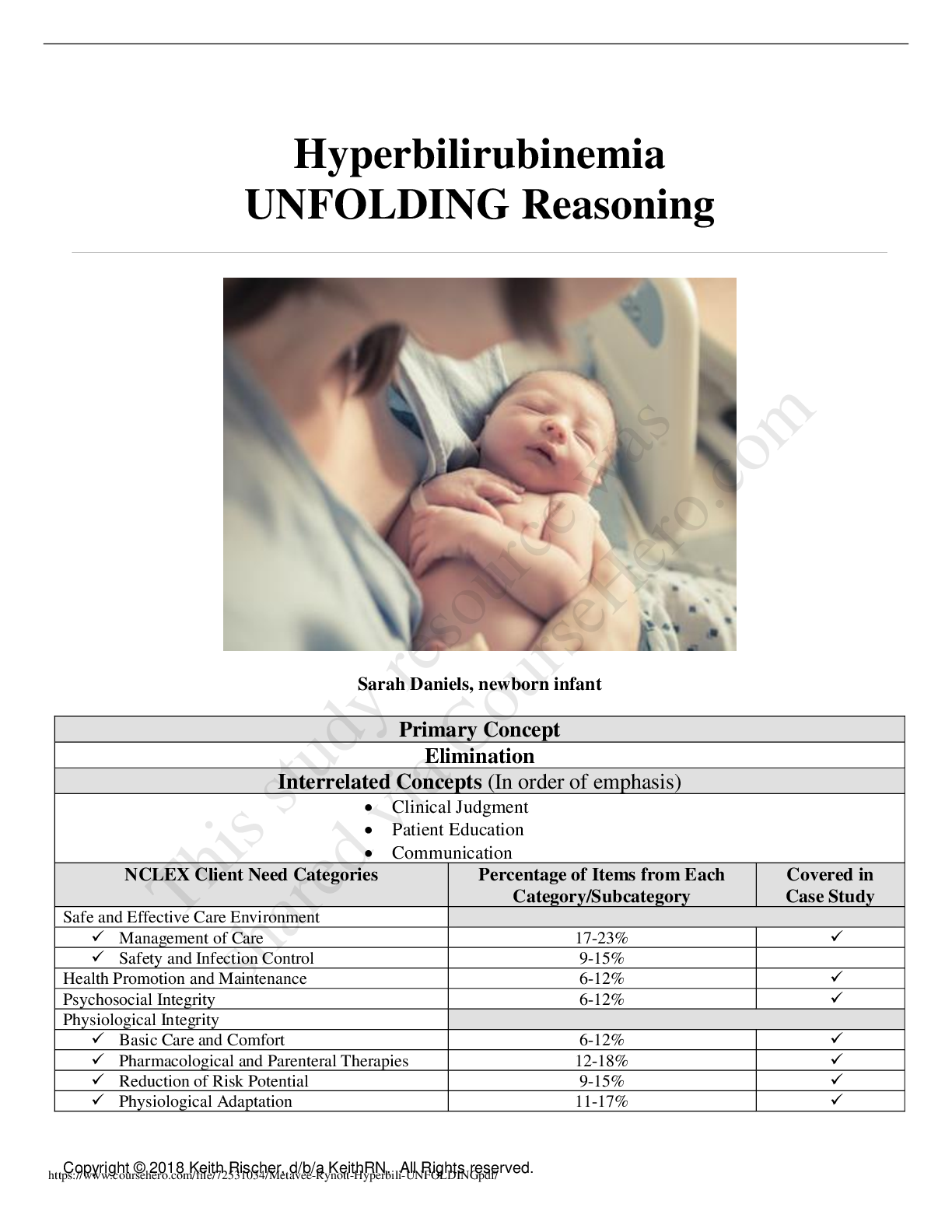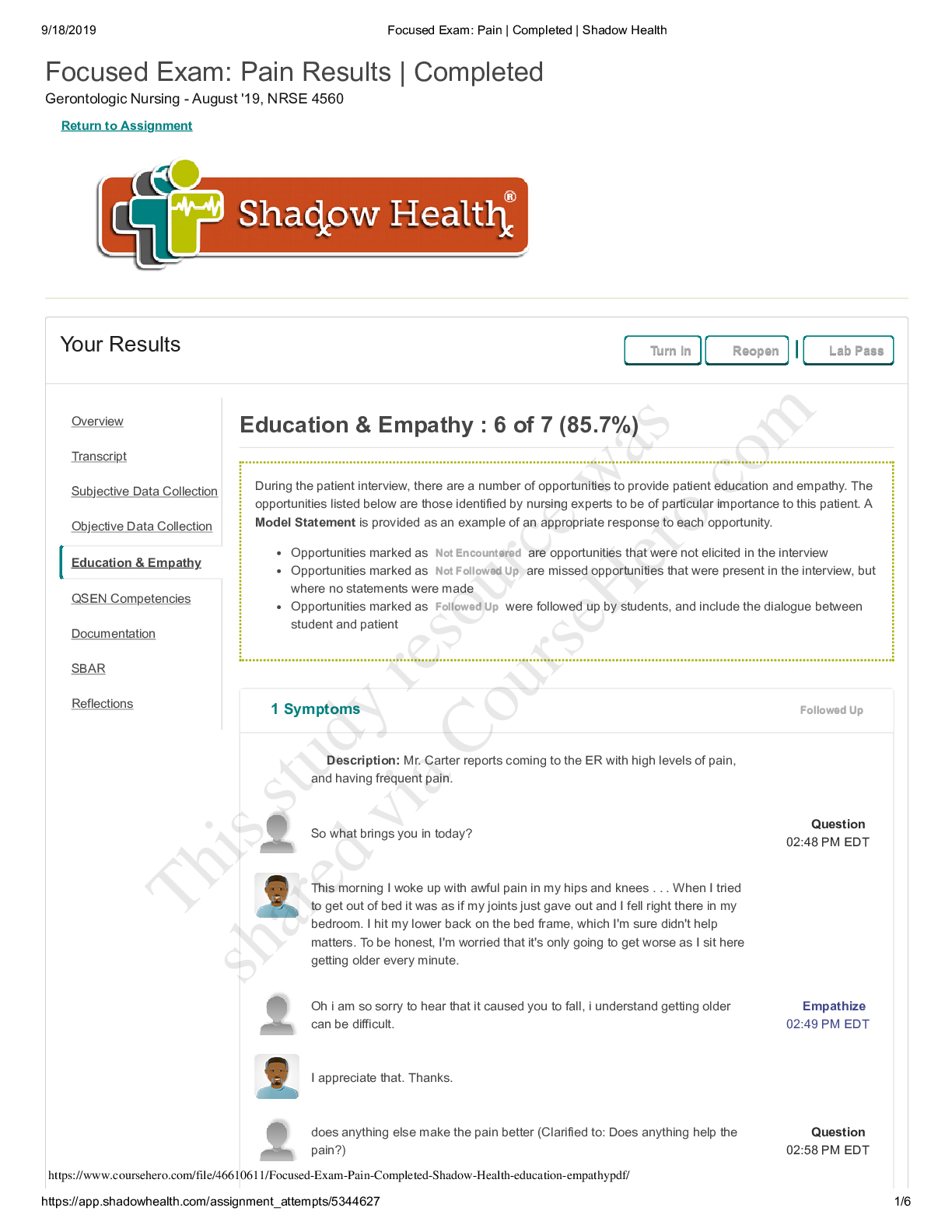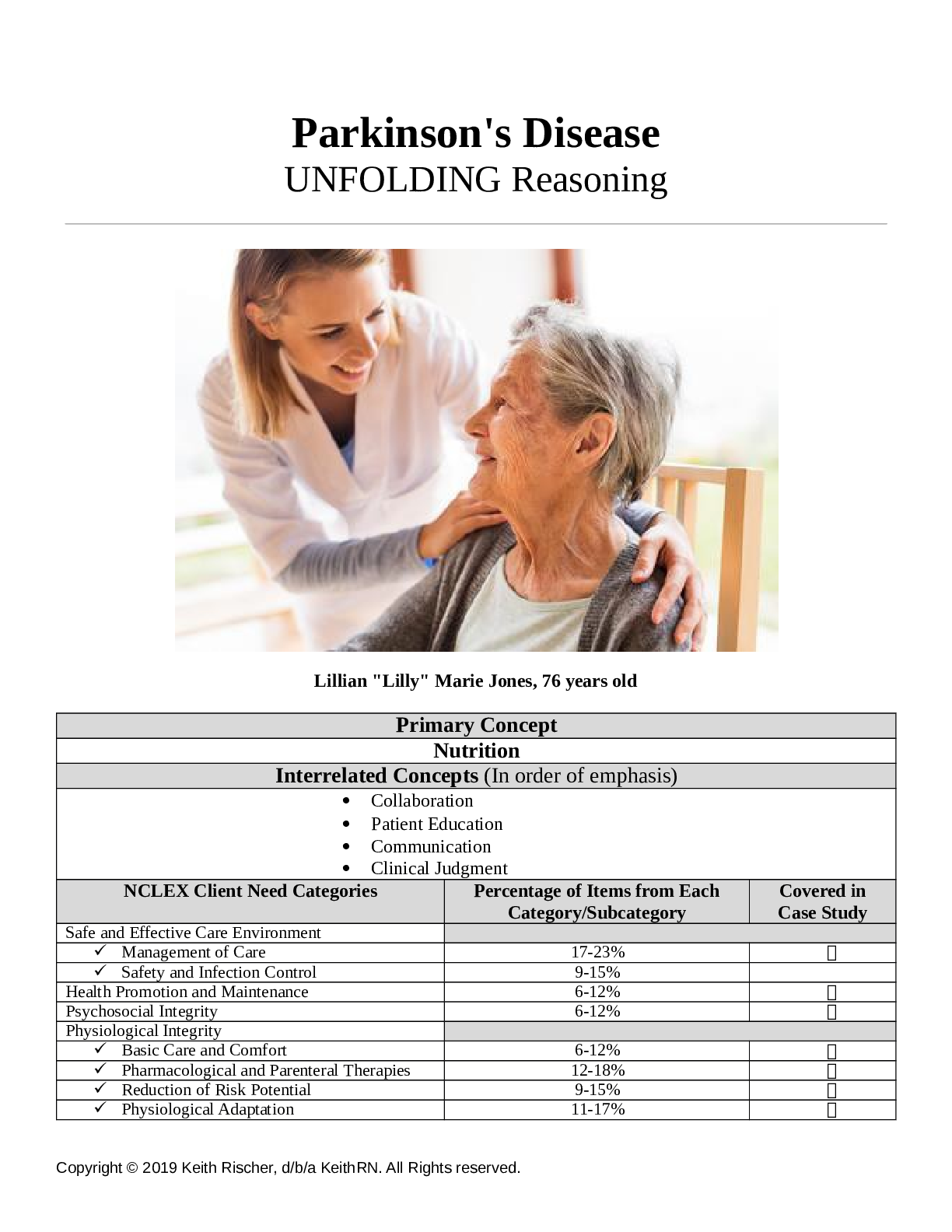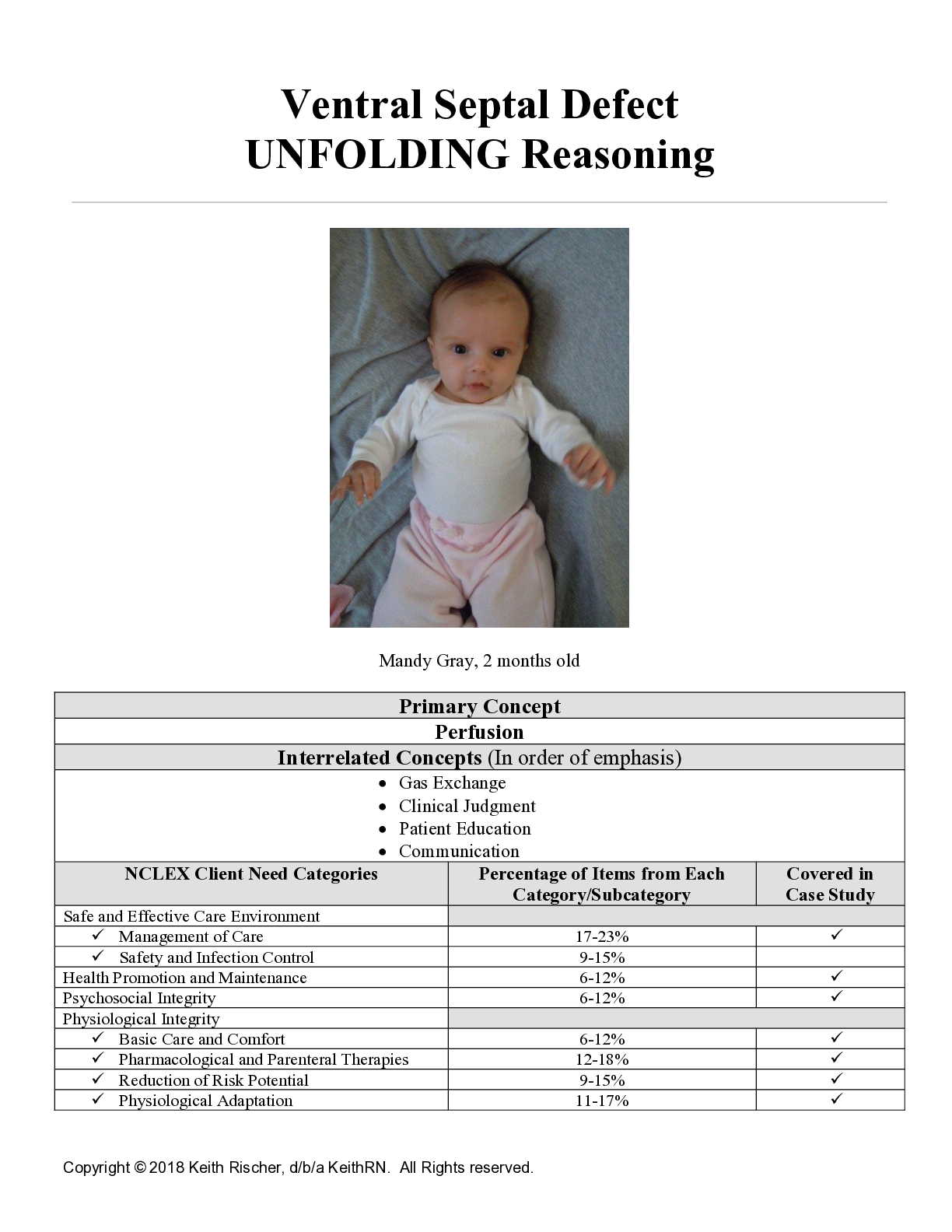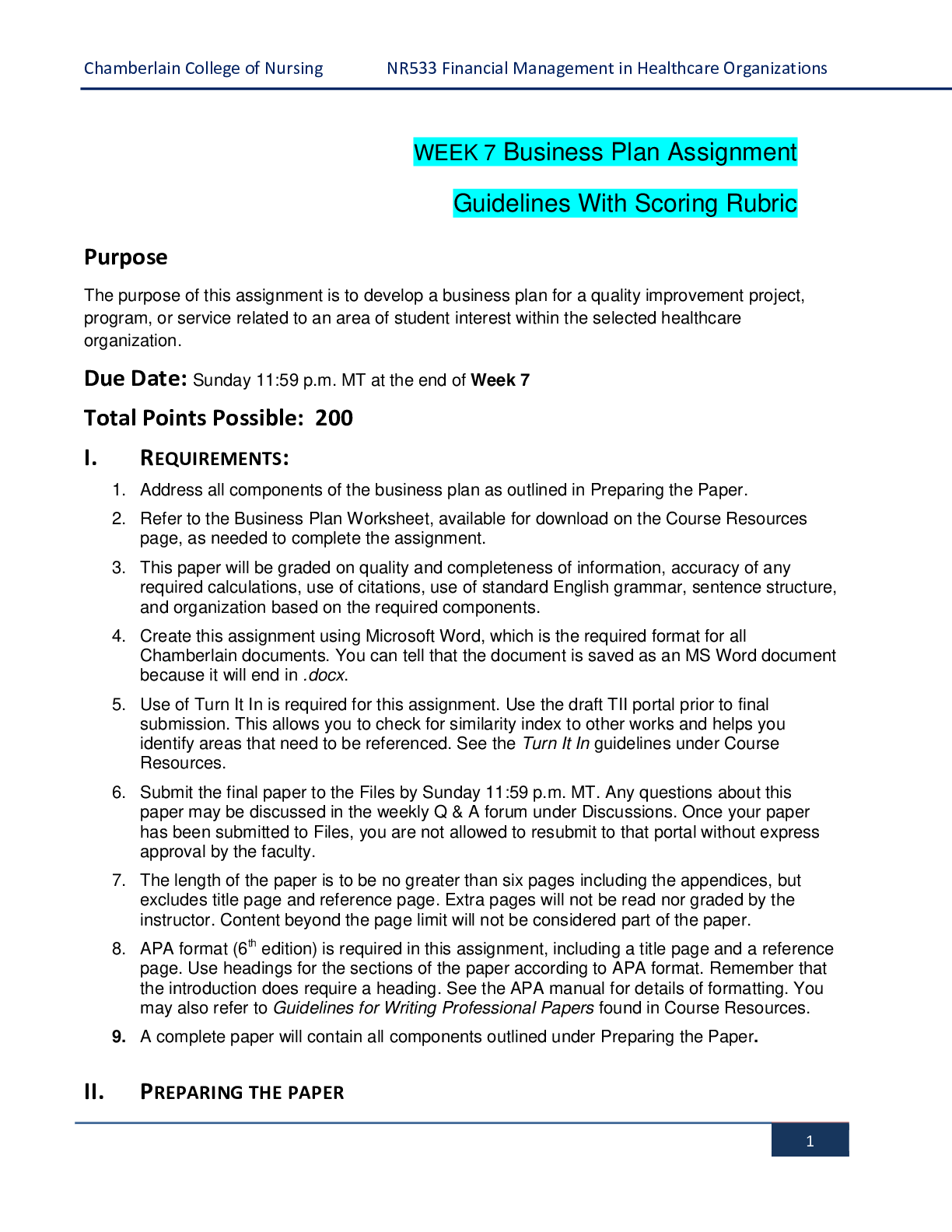*NURSING > CASE STUDY > NR 603 Week 2: Case Discussion Pulmonary Part 2 Follow-up visit- GRADED AN A+ (All)
NR 603 Week 2: Case Discussion Pulmonary Part 2 Follow-up visit- GRADED AN A+
Document Content and Description Below
NR 603 Week 2: Case Discussion Pulmonary Part 2 Follow-up visit 1. Determine appropriate treatment plan for Michelle. Discuss medications, doses, Durable Medical Equipment, and any testing, and a... pply these directly to her case. Provide your rationale with evidence. Treatment Plan: Part of the treatment plan is to ensure Michelle can purchase her medications since she is visiting a free medical clinic for the under-insured. All medications prescribed should be available in generic form. Michelle presents to the office with acute symptoms that developed 2 days ago, mild SOB with exertion, a respiratory rate of 24, temperature of 101.4, oxygen saturation of 94%, a nonproductive dry cough, fair chest expansion, and wheezing with inspiratory and expiratory. During her visit, Michelle received an influenza nasal swab test such as a rapid influenza diagnostic tests (RIDTs), which consist of swabbing the nasal cavity to detect influenza viral antigens. Results can take approximately 15 minutes (CDC, 2019c). Michelle’s results were positive for Influenza A and she is also experiencing associated symptoms. The CDC recommends an antiviral drug to treat Influenza such as Oseltamivir (Tamiflu) or peramivir (Rapivab). The antiviral drug Zanamivir (Relenza) should not be used due to the high risk of wheezing and other associated lung complications in asthmatic patients (CDC, 2020a). Antiviral drugs work best when used within 48 hours after symptoms begin. Michelle is within the 48-hours to receive Tamiflu (oseltamivir), which will helps reduce the duration of her flu symptoms and it is also available in generic form (CDC, 2020a and Epocrates, 2020a). Michelle also presented to the clinic with a temperature of 101.4. A fever is a physiological protective response of the body to help host defenses. An infection can stimulate the body thermoregulatory system, resulting in increased heat production. Hyperthermia is caused when the body thermoregulatory continues increase beyond 38.3 °C, to prevent irreversible tissues damage it is important to treat the fevers (Doyle, J.F., Schortgen, F., 2016). A combination alternating therapy of Acetaminophen (Tylenol) and ibuprofen (Advil) is effective in reducing fevers. Michelle will receive one Tylenol extra strength of 500mg tablet during her office visit to help reduce her fever (Barbi, E., Marzuillo, P., el at., 2017). Medications: Rx: Tamiflu (oseltamivir) 75 mg Sig: Take one capsule twice daily for 5 days (Epocrates, 2020c). Rx: Tylenol extra strength (acetaminophen extra strength) 500mg Sig: Take one to two tablets by mouth every 4 to 6 hours (Epocrates, 2020b). RX: Advil (ibuprofen) 400 mg Sig: Take one pill every four hours or two pills every 6 to 8 hours (Epocrates, 2020c). 2. Decide whether she is safe to return home, include any prescriptions, or if a referral to a higher level of care is required. Discuss the criteria used to make your decision, how a referral is made and defend your position. Michelle is also experiencing an exacerbation of her asthma due to an acute illness of influenza A. Based on the Global Initiative for Asthma (GINA), an asthma exacerbation can be treated in the primary care setting. A physical examination can determine the severely of the exacerbation and the need for emergency care. Exacerbation with the presents of drowsiness, confusion, respiratory rate greater than 30, accessory muscle use, heart rate of 120 or greater, and oxygen saturation less than 90% require emergency care (GINA, 2020). Michelle’s current symptoms do not warrant emergency care or a referral to pulmonologist since she has controlled asthma. Michelle can be treated in a primary care setting and can be home with the prescriptions listed above. Michelle will be instructed to use her inhaler as needed for respiratory symptoms at home. Since Michelle is having wheezing, she will receive an albuterol treatment before leaving the office. Michelle will be instructed to seek emergency care if she experiences any of the following symptoms such as shortness of breath, chest pain, abdominal pressure, seizures, unable to urinate, persistent dizziness, confusion, severer muscle pain or weakness, worsening of fever or cough after improvement and the worsening of pre- existing chronic condition(s) (CDC, 2020a). If Michelle chronic symptoms worsen an admission to hospital maybe needed and a pulmonologist can be consulted as needed (GINA, 2020). 3. Discuss relevant education and follow up plan. Influenza incubation period is about 1 to 4 days after initial exposure. The shedding of the virus usually occurs one day before the onset of symptoms, this is when the virus can be spread. Michelle will be instructed to self-isolate for at least 24-hours to void the spread of the virus to others. She will also be instructed to take her medications as prescribed and intake adequate fluids (MacPherson, & Ho, 2016). Since Michelle is a high-risk patient due to her asthma, she will receive education on the importance of receiving the influenza vaccine yearly (CDC, 2019b). Influenza is a self-limited condition with a recovery period of 3 to 7 days and usually only requires supportive care for symptoms. Unless Michelle condition worsens no follow-up, appointment is needed at this time. However, Michelle will receive a wellness call in 1 week for a status update. (Ghebrehewet, MacPherson, & Ho, A., 2016). Before leaving the office, Michelle will receive an action plan and instructed to seek emergency care if she experiences any emergency warning symptoms (GINA, 2020). References Barbi, E., Marzuillo, P., Neri, E., Naviglio, S., & Krauss, B. S. (2017). Fever in Children: Pearls and Pitfalls. Children (Basel, Switzerland), 4(9), 81. https://doi.org/10.3390/children4090081 Center for Disease Control. (2019c). Rapid Diagnostic Testing for Influenza: Information for Clinical Laboratory Directors. Retrieved from https://www.cdc.gov/flu/professionals/diagnosis/rapidlab.htm Center for Disease Control. (2020a). Flu and People with Asthma. Retrieved from https://www.cdc.gov/flu/asthma/index.htm Center for Disease Control. (2020b). People at high risk for flu complications. Retrieved from https://www.cdc.gov/flu/highrisk/index.htm Doyle, J.F., Schortgen, F. (2016). Should we treat pyrexia? And how do we do it?. Crit Care 20, 303 (2016). Retrieved from: https://doi.org/10.1186/s13054-016-1467-2 Epocrates. (2020a). Advil. Retrieved from https://online.epocrates.com/drugs/otcs/433010/Advil/Monograph Epocrates. (2020b). Tylenol Extra Strength. Retrieved from https://online.epocrates.com/drugs/otcs/514410/Tylenol-Extra- Strength/Monograph Epocrates. (2020c). Tamiflu. Retrieved from https://online.epocrates.com/drugs/217110/Tamiflu/Monograph Ghebrhewet, S., MacPherson, & Ho, A. (2016). Influenza. The BMJ. Retrieved from: https://www.bmj.com/content/bmj/355/bmj.i6258.full.pdf Global Initiative for Asthma (GINA). (2020). Global Strategy for Asthma Management and Prevention. Retrieved from: https://ginasthma.org/wp- content/uploads/2020/06/GINA-2020-report_20_06_04-1-wms.pdf [Show More]
Last updated: 1 year ago
Preview 1 out of 5 pages
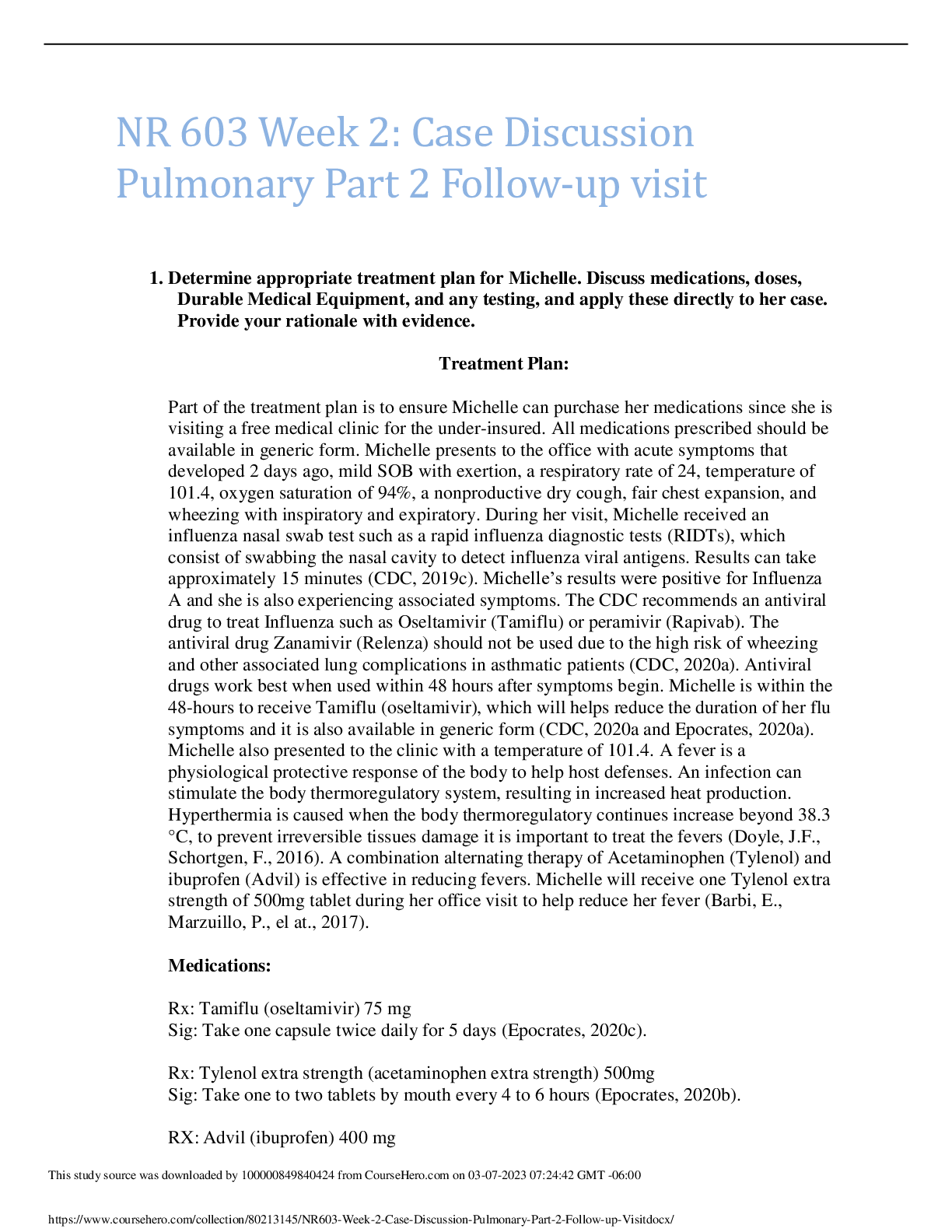
Reviews( 0 )
Document information
Connected school, study & course
About the document
Uploaded On
Mar 07, 2023
Number of pages
5
Written in
Additional information
This document has been written for:
Uploaded
Mar 07, 2023
Downloads
0
Views
47


